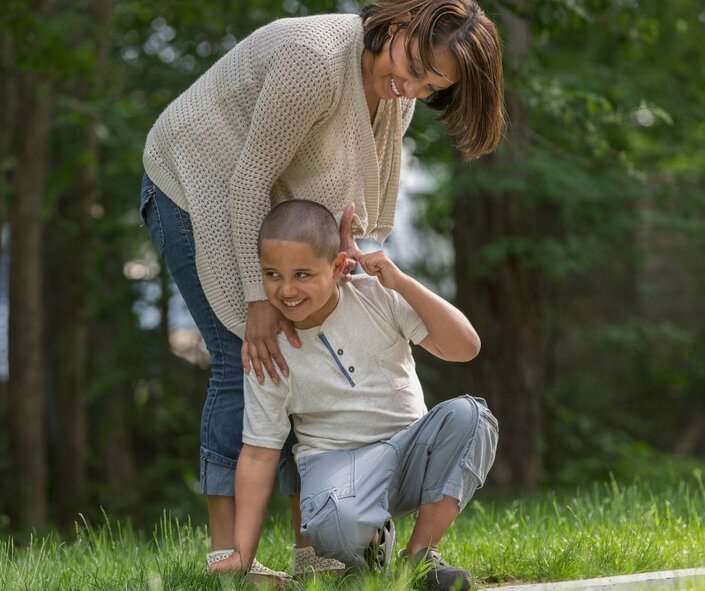Speech Delay vs. Autism Spectrum Disorder: What's the Difference?
Is your child not speaking as much as his peers, or have they not yet said their first words? Is this a sign of autism spectrum disorder (ASD)? Not necessarily.
This article will discuss the differences between speech delay and autism. We will also talk about the characteristics of each, as well as how to get help.
What Are the Signs of Delayed Speech?
What Causes Speech and Language Delays?
What Are the Early Signs of Autism?
How Can You Tell the Difference Between a Late Talker vs. Autism?
When Should You Seek an Evaluation for Your Child?
How Can Speech Therapy Help Communication Skills?
What Are Other Specific Treatment Options Available for Autism?
What Are the Signs of Delayed Speech?
If your child does not meet the typical developmental milestones for their age, they may have a speech or language delay.
Speech development can vary from one child to the next. However, these are signs that your child may be speech delayed:
4-6 months: not babbling.
By 12 months: not stringing together consonant-vowel combinations (e.g., "da" or "ma"), not using gestures like pointing and waving.
By 18 months: trouble imitating sounds; saying only a few words; not understanding what others say; prefers to use gestures over vocalizing to communicate.
By 24 months: difficulty understanding simple instructions; does not combine words together like "Mommy go" or “hat on.”
Two years: using fewer than 50 words; having trouble playing with and interacting with other children.
Three years: not speaking in brief, simple sentences; not using plural words or pointing out body parts.
Four years: unable to share a simple story or form sentences 4-5 words in length. Difficulty understanding pronouns, such as "you" and "me."
There are several types of speech and language disorders. Speech disorders involve mispronunciations of words or sounds, while language disorders involve getting a message across or understanding a message from others.
Articulation Disorder
An articulation disorder occurs when a child cannot produce the correct sounds, resulting in mispronunciations or omissions of entire words. An articulation disorder is also known as a "speech sound disorder" or a "phonological disorder." Examples of articulation disorders are difficulty saying "thoup" for "soup" or "caw" for "car." Articulation disorders can make it hard for you to understand your child's speech.
Language Delay
A language delay is when a child has trouble understanding or using words effectively. A receptive language delay is a difficulty with language comprehension (written or verbal), and an expressive language delay is when a child has trouble speaking and expressing thoughts or feelings.
What Causes Speech and Language Delays?
There are many possible reasons for speech and language delays to occur. The most common are:
Hearing loss, including children who have recurrent ear infections and those who are hearing impaired
Autism Spectrum Disorder (ASD) or Fragile X Syndrome
Genetic disorders such as Down's syndrome
Intellectual disabilities
Brain Injury
Premature birth or low birth weight
What Are the Early Signs of Autism?
There are a number of telltale signs of autism. Some signs of autism spectrum disorder include difficulty understanding non-verbal communication, avoidance of eye contact, or not responding to their name being called. Other signs of autism include:
Difficulty understanding other's feelings
Persistent repetition of words or phrases (echolalia)
Delayed language development
Prefers solitude
Difficulty making friends or playing social games
Repetitive behaviors, such as spinning or rocking
Has trouble with minor changes to their routine
What Causes Autism?
The cause of autism spectrum disorder is still unknown. However, researchers believe that it may be caused by a combination of genetic and environmental factors.
Some researchers believe that autism may be caused by genetic disorders such as Rhett syndrome or Fragile X syndrome.
Some possible environmental triggers being investigated include exposure to viruses, pollutants, or chemicals during pregnancy.
According to extensive research, there is no evidence indicating a link between autism spectrum disorder and any vaccines.
Research is still needed to determine the exact cause of autism.
How Can You Tell the Difference Between a Late Talker vs. Autism?
Speech delays and autism spectrum disorder can both impact language development. However, there are some notable differences between the two problems. Speech delay is a problem where a child has difficulty developing speech and language skills. In contrast, autism spectrum disorder is a neurological disorder that affects social skills, learning, communication, and behavior.
Children with a speech delay seek out close personal relationships with their parents and peers, respond positively to attention, and mimic the behaviors of people around them. A child with a speech delay tends to use body language and eye contact naturally. Autistic children, on the other hand, may have trouble with social interaction, play skills, communication, and behavior. Children with autism may prefer to be alone.
Another way to differentiate between a speech delay and autism is by looking at speech patterns. Children with speech delays will often have difficulty producing specific speech sounds. Autistic children may also have trouble making speech sounds but may also use persistent repetition of words or phrases (echolalia).
Children with speech delays may also have difficulty with motor skills. They may have trouble with coordination tasks, such as writing or using scissors. Children with autism may have difficulty with motor skills but exhibit repetitive body movements, such as hand spinning or flapping.
When Should You Seek an Evaluation for Your Child?
An evaluation by a speech-language pathologist, developmental pediatrician, or another autism specialist can help determine if your child has a speech delay, autism, or another problem.
If you have any concerns about your child's speech or language development, talk to your pediatrician. You may want to have your child evaluated if they have not yet reached the following milestones:
Not yet babbling by 12 months old
Does not say single words by 16 months old
Does not put two words together by 24 months old
Does not respond to their name
Loses speech or language skills that they once had
Speech-language pathologists can be a part of the diagnostic process and provide you with resources and support to help your child develop social, communication, and behavioral skills.
No matter what problem your child is diagnosed with, it is essential to seek an evaluation as soon as possible. Early intervention is critical while your child is developing important speech skills needed to thrive.
How Can Speech Therapy Help Communication Skills?
Speech therapy can help with speech sound production, speech fluency, and language development. A speech therapist can help your child develop the skills needed to communicate effectively.
If your child has a speech delay or autism, speech therapy can help them communicate more effectively.
Speech therapy can help with speech sound production, speech fluency, and language development. If your child has an articulation disorder, speech therapy will focus on improving speech sound production. In articulation therapy, the therapist may help the child practice making certain sounds.
If your child has a language disorder, speech therapy will focus on improving language skills. For example, if a child has difficulty understanding words, the therapist may work on following simple directions. If the child has problems expressing themselves, then the therapist may work on increasing their vocabulary.
If your child has autism spectrum disorder, speech therapists can help your child establish strong social connections and social communication skills. Pragmatic or social skills are the ability to interact with others and use language in a socially appropriate way. For example, speech therapists can help autistic children learn to take turns in conversation, stay on topic, and understand nonverbal cues.
How Does Speech Therapy Work?
Speech therapy is an excellent way for children to learn speech and language skills. It is also a lot of fun for children.
The speech therapist will often play games and use activities to help the child learn. For example, the therapist may have the child repeat words or phrases while playing a game. This allows the child to learn the words and also have some fun.
The speech therapist may also use flashcards with pictures to help the child learn words. The therapist will often have the child point to the picture when they hear the word. This allows the child to learn to associate words with objects.
Speech therapy can be provided in a group or one-on-one setting. Many speech therapists also work with families to provide them with the tools needed to support their child's speech and language development.
In order to support their child's speech and language development, it is important for families to be involved in speech therapy. Families can help by providing a supportive home environment that promotes speech and language development. They can also help by practicing the skills that the therapist teaches their child.
Early intervention is key, so be sure to talk to your child's doctor if you have any concerns about their speech or language development.
What Are Other Specific Treatment Options Available for Autism?
If your child is diagnosed with autism, several treatment options are available. These include behavioral therapy, speech therapy, and occupational therapy.
Behavioral therapy is a type of treatment that focuses on helping autistic children develop social and communication skills. Speech therapists work with children to improve their speech sounds, articulation, fluency, and voice.
In addition, speech therapists can also help autistic children develop social and pragmatic skills. Social skills are the ability to interact with others. Pragmatic skills are the ability to use language in a socially appropriate way.
Occupational therapy is another treatment option for autism. Occupational therapists help children with autism improve their fine motor skills, gross motor skills, and sensory processing. They may also provide equipment to help children with autism participate in daily activities.
There is no one-size-fits-all approach to treating autism. Treatment plans will be tailored to your child's individual needs. Be sure to talk to your child's doctor about the best treatment options for your child.
How Can You Find a Qualified Speech Therapist?
If your child is struggling with communication skills, finding the right speech therapist is essential.
A qualified speech therapist will assess your child and determine the source of the problem. The therapist may also provide specific exercises and work closely with families to improve communication skills. In many cases, speech therapy can help your child make significant progress in a short amount of time.
Many speech therapists can help children acquire new skills, but speech pathologists who have experience working with children with speech delay or autism are the most qualified.
Connected Speech Pathology offers therapy for children of all ages with speech delay or autism.
Learn more about the services we provide for children with autism or speech delay.
About the Author
Allison Geller is a communication coach, speech-language pathologist, and founder of Connected Speech Pathology, an international online practice providing professional communication coaching and speech therapy for children, teens, and adults. With more than two decades of experience, she has worked in medical and educational settings, published research on aphasia, and leads a team of specialists helping clients improve skills in public speaking, vocal presence, accent clarity, articulation, language, fluency, and interpersonal communication.









